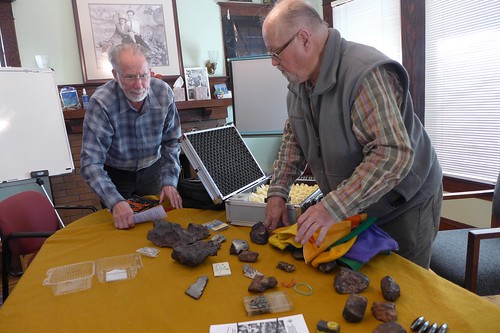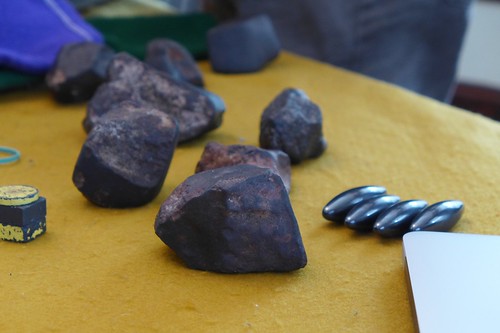Dick Pugh graced Wanderers with the latest version of his meteor talk this morning. He has polished this presentation over the years, however there are always new developments to roll into it.
Besides, good stories are worth hearing multiple times, like a favorite record album. Remember record albums? Dick is a world authority and former high school teacher. His talks are engaging.
He's still an avid collector and is savvy regarding the going rates for fragments from specific debris fields. Part of the fun of his talk is how it's peppered with mentions of obscure treasures, such as a junky old car, now worth oh so much more, now that a meteor has totalled it.
Dick gets several calls a week, average one or two a day, from people hoping what they've found is somehow valuable. More often than not, they have a piece of Oregon basalt, a ubiquitous material that makes Oregon an especially difficult hunting ground. The quarry (prey) and the background look so much the same.
Finding meteor fragments is so much easier in a sandy desert or in some arctic setting, where a large chunk of iron, or stone, sticks out and calls attention to itself.
Meteors come from asteroids, but also from Earth's moon and the planet Mars. High impact events fling fragments from those bodies into space, some of which fall into Earth's gravity well.
Don and I huddled over our computers after the talk, trying to get wanderers-announce working as a Yahoo! group. We already have wwwanderers (with three ws), which caters to those wishing to yak about issues of the day. Of late, few are yakking.
Contrary to popular belief, meteorites are not hot to the touch, even if they were fireballs upon entering the atmosphere. They've been coasting near absolute zero for eons and a short encounter with the Earth's atmosphere is not going to undo some billions of years of running cold.
Besides, good stories are worth hearing multiple times, like a favorite record album. Remember record albums? Dick is a world authority and former high school teacher. His talks are engaging.
He's still an avid collector and is savvy regarding the going rates for fragments from specific debris fields. Part of the fun of his talk is how it's peppered with mentions of obscure treasures, such as a junky old car, now worth oh so much more, now that a meteor has totalled it.
Dick gets several calls a week, average one or two a day, from people hoping what they've found is somehow valuable. More often than not, they have a piece of Oregon basalt, a ubiquitous material that makes Oregon an especially difficult hunting ground. The quarry (prey) and the background look so much the same.
Finding meteor fragments is so much easier in a sandy desert or in some arctic setting, where a large chunk of iron, or stone, sticks out and calls attention to itself.
Meteors come from asteroids, but also from Earth's moon and the planet Mars. High impact events fling fragments from those bodies into space, some of which fall into Earth's gravity well.
Don and I huddled over our computers after the talk, trying to get wanderers-announce working as a Yahoo! group. We already have wwwanderers (with three ws), which caters to those wishing to yak about issues of the day. Of late, few are yakking.
Contrary to popular belief, meteorites are not hot to the touch, even if they were fireballs upon entering the atmosphere. They've been coasting near absolute zero for eons and a short encounter with the Earth's atmosphere is not going to undo some billions of years of running cold.


